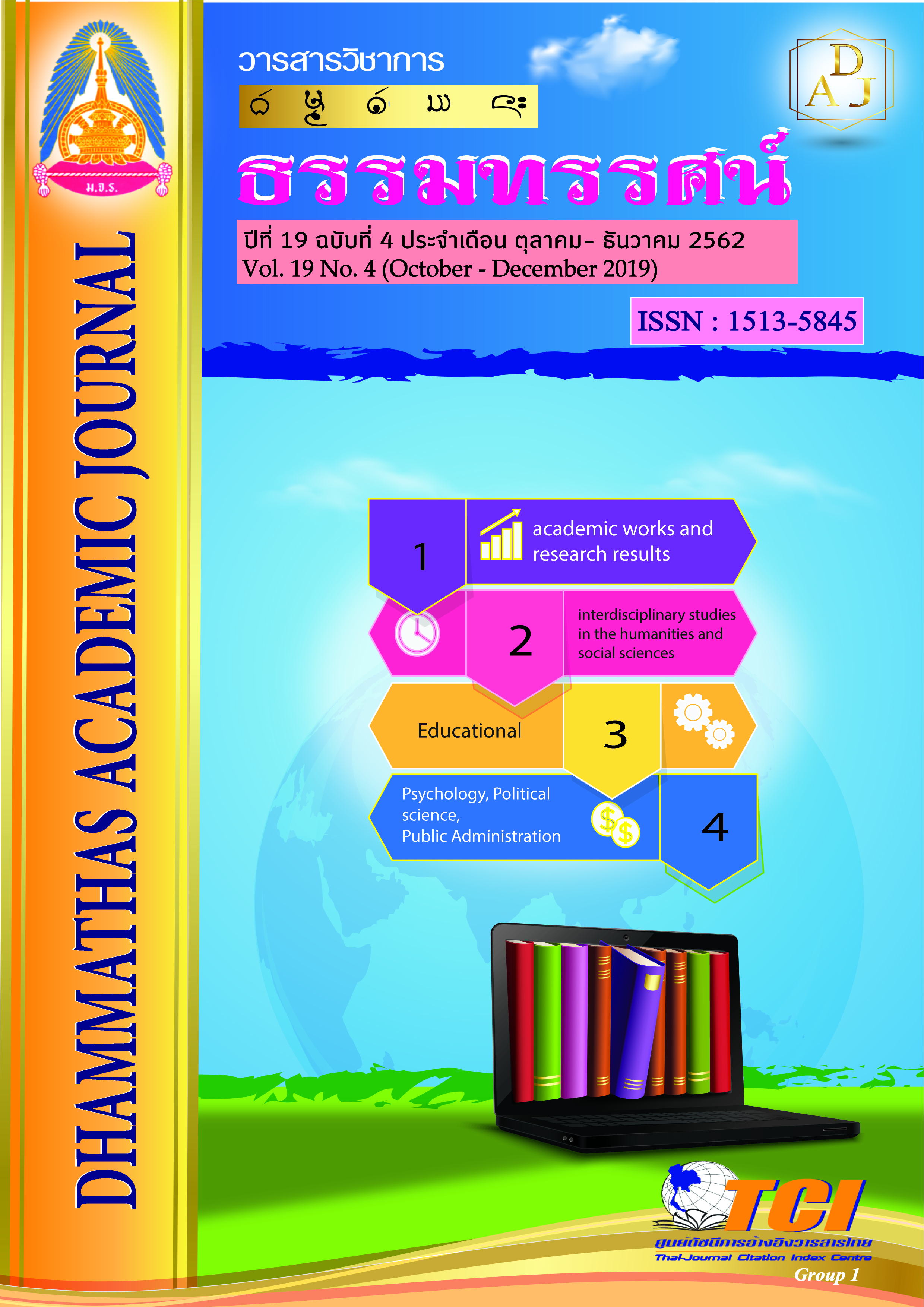Development of Buddhism-Based Rehabilitation for Drug Users in Compulsory System by Wat Tham Krabok, Saraburi Province
Main Article Content
Abstract
The objectives of the research were: 1) to study the development of rehabilitation, integrated with the Buddhist principle or based on Buddhism, for drug users (patients) in the compulsory system by Wat Tham Krabok, Saraburi province; 2) to make the comparative study of life skills of patients, classified by gender, age, educational level and occupation, after Buddhism-based rehabilitation by Wat Tham Krabok, Saraburi province; 3) to make the comparative study of life skills, self-esteem and satisfaction of the patients after Buddhism-based rehabilitation by Wat Tham Krabok, Saraburi province. The population of the research was a total of patients willing to participate in Buddhism-based rehabilitation by Wat Tham Krabok, Saraburi province, and the eighty-six samples as respondents were selected. The instruments used for data collection were comprised of three Likert’s five-point rating scale questionnaires: 20-item satisfaction test, 20-item life skill test, and 20-item self-esteem test. The whole satisfaction test’s reliability of Cronbach’s alpha coefficient was valued from 0.95 and its item discrimination was ranged from 0.60-0.80, the whole life skill test’s reliability of Cronbach’s alpha coefficient was valued 0.96 and its item discrimination was ranged from 0.63-0.83, and the whole self-esteem test’s reliability of Cronbach’s alpha coefficient was valued from 0.96 and its item discrimination was ranged from 0.62-0.84. The statistics used for data analysis were comprised of frequency, The objectives of the research were: 1) to study the development of rehabilitation, integrated with the Buddhist principle or based on Buddhism, for drug users (patients) in the compulsory system by Wat Tham Krabok, Saraburi province; 2) to make the comparative study of life skills of patients, classified by gender, age, educational level and occupation, after Buddhism-based rehabilitation by Wat Tham Krabok, Saraburi province; 3) to make the comparative study of life skills, self-esteem and satisfaction of the patients after Buddhism-based rehabilitation by Wat Tham Krabok, Saraburi province. The population of the research was a total of patients willing to participate in Buddhism-based rehabilitation by Wat Tham Krabok, Saraburi province, and the eighty-six samples as respondents were selected. The instruments used for data collection were comprised of three Likert’s five-point rating scale questionnaires: 20-item satisfaction test, 20-item life skill test, and 20-item self-esteem test. The whole satisfaction test’s reliability of Cronbach’s alpha coefficient was valued from 0.95 and its item discrimination was ranged from 0.60-0.80, the whole life skill test’s reliability of Cronbach’s alpha coefficient was valued 0.96 and its item discrimination was ranged from 0.63-0.83, and the whole self-esteem test’s reliability of Cronbach’s alpha coefficient was valued from 0.96 and its item discrimination was ranged from 0.62-0.84. The statistics used for data analysis were comprised of frequency, percentage, mean, and standard deviation; the hypothetical tests were conducted using the t-test for independent samples, the one-way analysis of variance (ANOVA) by using the F-test, Scheffé’s method for paired differences, and the descriptive analysis.
The findings of the research were as follows:
1. According to the rehabilitation plan, eighty-three respondents, accounting for 96.5%, were found able to spend 15 days of rehabilitation; three respondents, accounting for 3.4%, were found unable. Apart from the assessment after rehabilitation, eighty-three respondents, accounting for 96.5%, were found to pass the assessment; three persons, accounting for 3.4%, were not found to pass it.
2. After Buddhism-based rehabilitation, the respondents’ satisfaction, life skills and self-esteem on the development of Buddhism-based rehabilitation for the respondents in the compulsory system by Wat Tham Krabok, Saraburi province, were found to be overall at a high level.
3. After the development of Buddhism-based rehabilitation for the respondents in the compulsory system, the comparison of life skills of the respondents, classified by gender, age, and occupation, was found not to be overall different. Classified by educational level, it was found to be different at a statistically significant level of .05; it was found in accordance with the given hypothesis.
4. Classified by the respondents’ gender, the comparison of the respondents’ life skills, self-esteem and satisfaction on the development of Buddhism-based rehabilitation for the respondents in the compulsory system was found to be overall different at a statistically significant level of .01 whereas the opinions of the respondents with different age and educational level were found to be overall different at a statistically significant level of .05, and the opinions of the respondents with different occupations were found not to be different.

